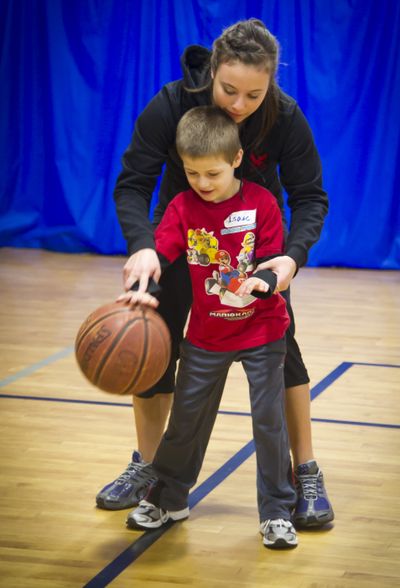Getting skills on, off court
Basketball program for autistic kids launches

The thumping sound of bouncing basketballs echoed throughout the Warehouse on a recent Sunday morning. While a men’s league sank 3-pointers on one court, another group warmed up nearby.
“I want to play a game of basketball!” shouted 6-year-old Henry.
He was one of a dozen kids gathered to learn some new skills. But the primary focus of this league isn’t dribbling and shooting – it’s social interaction. Last month, Northwest Autism Center launched its first recreational basketball program for children with autism spectrum disorder.
Created and overseen by Shira Ackerman, the program focuses on incorporating socialization skills along with basketball techniques. “I played basketball in high school and college,” she said. “It’s easy enough to take a sport you have a passion for and turn it into something else.”
Ackerman is the director of the Domino Project, an intensive early intervention program for young children on the autism spectrum and their typically developing peers, as well as a university-based teaching and observation center for students, educators and other autism professionals. Northwest Autism Center created the Domino Project in 2005 in collaboration with Eastern Washington University and Providence Sacred Heart Children’s Hospital.
At the Warehouse, EWU students and Domino staff donned workout gear and led children ages 6 to 11 through some warm-up exercises. Henry, however, had his eye on the ball. He pointed to a garbage can filled with basketballs and asked, “Can I pick my own basketball?”
The effects of autism vary greatly from child to child. The disorder can affect language, emotion, social interaction and behavior.
“There’s very few recreational opportunities for this population,” Ackerman said.
As the kids worked on passing and dribbling skills, she said, “If you look at any of these kids you may notice they’re a little different, but there’s no outwardly apparent physical disability.”
However, it quickly became obvious that for some of the children the stimulation of the noise, the lights and the people was a bit overwhelming. Zachary Hjort, 9, headed to the sidelines at any opportunity. Volunteers patiently brought him back and helped him focus on the task at hand – in this case dribbling.
Zachary appeared distressed, but a Domino staffer said, “Can you count how many times you dribble the ball?”
Immediately Zachary began counting, “One, two, three, four, five … .” He counted faster and faster as the ball bounced ever lower to the ground. When it rolled away, a volunteer quickly retrieved it, and the counting started anew. The repetition of the numbers soothed Zachary and helped him focus on the ball.
Meanwhile, Cale Strom-Baker, 9, worked on passing skills. “I got a trick I can do,” he said, and deftly bounced the basketball under his leg. However, what he really wanted to talk about was Mario Kart Racing. “What level have you beat?” he asked.
Warm-ups complete, Henry was in his element, demonstrating his left-handed and right-handed dribbling skills. “I’m a good basketball player!” he said.
When a staffer asked if he could stand on the number three to practice his bounce pass, Henry replied, “No, but I can stand by the number seven!”
Ackerman smiled. While she hopes the kids will improve their basketball skills, a far more important goal is helping them understand the social mysteries of team sports. For children with autism spectrum disorder mastering these skills can be far more difficult than making three-point shots.
Ackerman said, “We want these kids to be able to play with their peers on the playground at recess.”